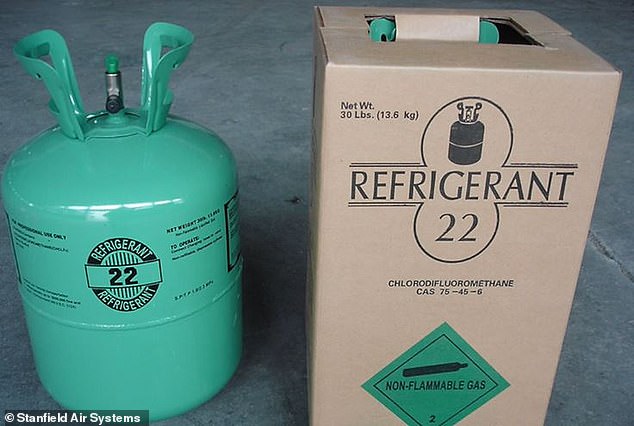
A California man has become the first American to be charged with smuggling greenhouse gases into the US and could face up to 20 years in prison for the crimes.
Michael Hart, 58, was arrested Monday due to violating a 2020 federal regulation that prohibits the importation of hydrofluorocarbons (HFCs), which is a synthetic gas used in refrigerators and air conditioners.
HFCs can be hundreds to thousands of times more potent than carbon dioxide at trapping heat in the atmosphere, exacerbating the climate crisis.
Hart allegedly snuck the ‘super pollutants’ into the US from Mexico and proceeded to sell the man-made organic compounds for a profit.
He made his first appearance in federal court shortly after being taken into custody, where he entered a not-guilty plea – Hart’s next hearing is on March 25.


Hart allegedly snuck the ‘super pollutants’ into the US from Mexico and proceeded to sell the man-made organic compounds for a profit (stock)
The US Department of Justice told DailyMail.com that Hart’s photo has not yet been released to the public.
This is the first prosecution in the United States to include charges related to the American Innovation and Manufacturing Act of 2020 (AIM Act).
The law calls for an 85 percent reduction in production and use of the climate-damaging chemicals by 2036.
It aligns with an 2016 international agreement that compels the US and other countries to limit use of HFCs.
David Uhlmann, assistant administrator for enforcement at the Environmental Protection Agency (EPA), said: ‘The illegal smuggling of hydrofluorocarbons, a highly potent greenhouse gas, undermines international efforts to combat climate change.
‘Anyone who seeks to profit from illegal actions that worsen climate change must be held accountable.’
A federal indictment alleges that Hart concealed the refrigerants under a tarp and tools inside his vehicle as he passed through Mexico’s border patrol.


He is then said to have sold the gas on Facebook Marketplace and other sites.
Facebook Marketplace has many offerings for the refrigerant, with some selling as much as $500 a tank.
In addition to greenhouse gases, the indictment alleges that Hart imported HCFC-22, an ozone-depleting substance regulated under the Clean Air Act.
Hart charges of conspiracy, importation contrary to law and sale of merchandise imported contrary to law.
Fines for the charges amount to $750,000.
Hart’s next hearing is before US District Judge Jeffrey T. Miller for motion hearing/trial setting on March 25, 2024, at 11am PT..
‘The charges and allegations contained in an indictment are merely accusations, and the defendants are considered innocent unless and until proven guilty,’ according to the US Justice Department press release.
Hart’s arrest comes just days before 19 environmental; companies, universities and experts signed an open letter on the importance of short-lived climate pollutants (SLCPs) in national and corporate climate action plans, urging ‘broad and swift action to abate their emissions.’
SLCPs include HFCs, methane, soot (black carbon), carbon monoxide and aviation contrails, which together account for nearly half of industrial-era global heating.
Unlike CO2, which remains in the atmosphere as a long-lived greenhouse gas for hundreds to thousands of years, SLCPs have much shorter atmospheric lifetimes on the scale of years to days.
Cutting the rate of SLCP emissions — even if gross SLCP emissions do not reach zero — can therefore rapidly reduce the rate of atmospheric warming.
‘One of the fastest, most efficient solutions to prevent us from reaching dangerous levels of warming is to look beyond only carbon dioxide (CO2) and rapidly reduce short-lived climate pollutants,’ the letter said.
In regard to HFCs, the letter pointed to improved refrigerant management and deployment of low-GWP refrigerants.
‘Feasible SLCP cuts from existing technologies today can avoid up to 0.6° C by 2050: four times more in that time period than CO2 cuts alone,’ reads the letter.
‘These short-term cuts are our best chance to reduce the risk of hitting near-term tipping points which could create vicious climate feedback loops.
‘These reductions can also annually avoid millions of air pollution deaths and crop loss tonnes. In short, global climate goals can only be met with swift and decisive action on both long-lived and short-lived pollutants.’
This post first appeared on Dailymail.co.uk








